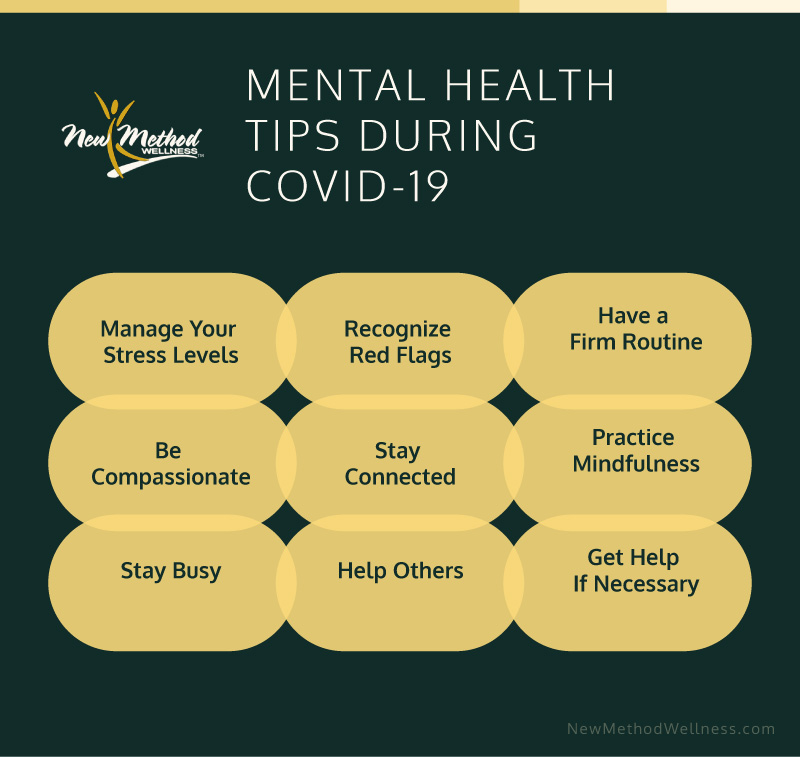The Covid-19 pandemic has negatively affected the behavioral health of many in the country. The stress of social isolation and fear of getting the disease has increased cases of depression and anxiety. For those already struggling with behavioral health conditions, the Covid-19 crisis has exacerbated it for many. You might be one of those people feeling overwhelmed with stress, worry and fear, but there are some good tips on how to cope. Let’s take a look.
What Are The Symptoms of Covid-19 Mental Distress?
Do you know what the symptoms of mental distress are? Severe anxiety and mental distress over Covid-19 can manifest in many ways. Such symptoms can affect all areas of your life and health. The following are some common signs:
• Feeling numb, fearful or anxious
• A change in your appetite and/or energy levels
• Difficulty concentrating
• Problems falling asleep or staying asleep
• Nightmares or distressing images
• Anger or agitation
• Worsening of a chronic health problem such as asthma
• Physical manifestations like headache, stomach problems or body aches
As you can see, mental and emotional distress can manifest in a variety of ways. If you have any combination of these symptoms, you might be having a behavioral health crisis.
Manage Your Stress Levels
Managing stress is important for good behavioral health in general. However, it’s important to keep a closer eye on it during Covid-19. Maybe you initially thought that the lockdowns would yield creative production through isolation. Perhaps you expected to get more done around the house, only to find yourself distracted with low energy and a short temper. Consider these stress-management tips for coping during the Covid-19 pandemic:
• Take care of your physical health through stretching, meditating or going on long walks
• Focus on eating healthy and balanced meals
• Be careful about indulgences like alcohol or sweets
• Get plenty of sleep
• Make time to unwind and engage in fun hobbies
• Limit the time you spend watching the news or reading social media about Covid-19
Recognize Red Flags
One important aspect of managing your stress levels and behavioral health is to know what thoughts and feelings are red flags. You may recognize certain thought patterns or feelings as indications that you’re stressed or distressed. The following are some common examples of these red flags:
• Feeling frustrated, worried or sad
• Physical sensations like the jitters, an upset stomach or tension
• Thoughts like “why can’t I focus?”
• Compulsively checking the latest news on Covid-19
Recognizing when any or all of these are in play gives you the chance to stop them before they become distressing. Interrupt yourself through deep breathing exercises like box breathing. Breathe in and count to four, then hold for four seconds, and breathe out for four seconds. Hold for four seconds and then repeat the exercise until you feel calm again.
You might also consider doing something as an outlet to distract yourself. For example, go outside and walk, or do a household chore that you’ve been meaning to get to. If you have a pet, play with him for a short time.
How Routines Can Help Behavioral Health
Having a firm routine helps mitigate anxiety and lower your stress levels. If you’re like many during Covid-19, you’re probably working at home. It’s important to make distinctions between work time and non-work time. This includes making physically different spaces for them in your house if possible. Try to work in short bursts and then take refreshing breaks. Find something enjoyable to do during non-work time. Avoid using your relaxation time to check Covid-19 news.
Be Compassionate
Be compassionate to others, but also to yourself. Feeling depression or anxiety over things you can’t control isn’t unusual, but it’s not good for your behavioral health to wallow in it. It’s normal to have thoughts of “this is too hard” or “I can’t do this,” but it’s important not to let these thoughts overwhelm you. Recognize that you can’t always be your best self. Reach out to others for help, and be available when others reach out to you. Realize that your friends, family and neighbors are likely also struggling with their behavioral health.
Stay Connected
Social isolation is typically not good for anyone’s behavioral health. Don’t let yourself fall off the radar of your friends and family. Even if you can’t physically meet with them during Covid-19, you can arrange to see them through video calls or virtual forums. When you meet virtually, make sure to discuss enjoyable things and what you might do when Covid-19 is over. Don’t fixate on the news or stats regarding Covid-19.
Practice Mindfulness
Anxiety occurs when you worry too much about the future or the past. Depression might result when you fixate on things that you can’t control or the feeling that things won’t get better. Practice mindfulness by staying in the present. Consider meditating daily to get in the habit of being mindful. Meditation and mindfulness are excellent tools for improving behavioral health during uncertain times.
Stay Busy
Being idle during Covid-19 can make it more tempting to look up news and statistics. If you’re out of work or are working less, you can still stay busy by being productive around your house or yard. Make a list of chores that need to be done or projects that can be started. You can also take up a new hobby like knitting or putting puzzles together. Anything that holds your focus and keeps you from thinking about Covid-19 can work.
Help Others
You can also find purpose in supporting and helping the people around you. Do you have family or friends who can’t go out due to vulnerable health conditions? Consider going out and shopping for them. If you know someone quarantined for Covid-19, you can also volunteer to bring them groceries or other essentials. If you don’t have any significant projects around your house, perhaps you can visit family members and help with their projects if it’s safe.
Get Help If Necessary
If you have worsening behavioral health symptoms such as severe depression or increasing substance abuse, it’s important to get help and not assume they will go away. You have several options for getting help when you feel like your behavioral health is deteriorating.
• Contact a close friend or family member
• Contact a spiritual leader
• Call your doctor or behavioral health professional
• Contact the National Alliance on Mental Illness or the Substance Abuse and Behavioral Health Services Administration
Even when the Covid-19 pandemic is over, it’s important to continue these self-care tips to keep stress from overwhelming you.
If you or someone you know is experiencing a behavioral health crisis due to Covid-19 or any other reason, reach out to New Method Wellness today. Our caring professionals are experienced in treating behavioral health conditions such as depression, anxiety and addiction.
For more information about our Wellness Methods call 866.951.1824 today!








